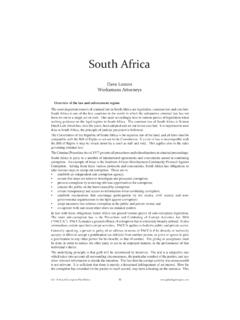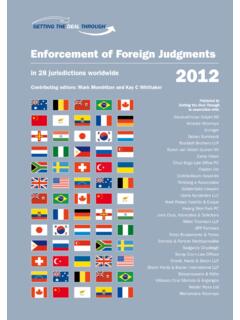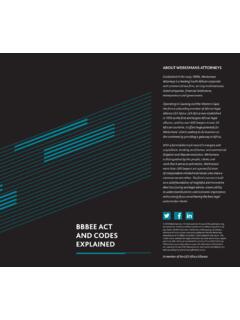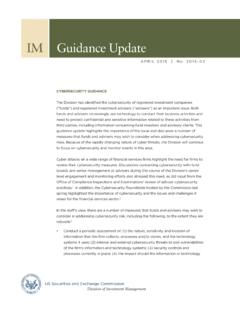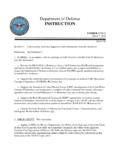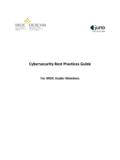Transcription of A REVIEW OF THE KING IV REPORT ON CORPORATE …
1 A REVIEW OF THE KING IV REPORT ON CORPORATE GOVERNANCETABLE OF CONTENTS WHAT IS KING IV AND WHEN WILL IT BECOME EFFECTIVE?4 WHY THE UPDATE FROM KING III?6 HOW IS KING IV DIFFERENT FROM KING III?8 WHAT ARE THE 17 PRINCIPLES?12 HOW SHOULD THESE PRINCIPLES BE IMPLEMENTED?18 SECTORAL DETERMINATION20 WHAT ARE THE CONSEQUENCES OF NON-COMPLIANCE WITH THE KING IV CODE?24 MEET THE AUTHORS26 MEET THE draft of the fourth edition of the King Reports on CORPORATE Governance, namely the King IV Code, was published by the institute of Directors in Southern Africa NPC (IoDSA) for public comment on 15 March 2016. IoDSA, as Secretariat for the King Committee and custodian of the King Reports on CORPORATE governance in South Africa, has led the development of King King IV Code sets out the philosophy, principles, practices and outcomes which serve as the benchmark for CORPORATE governance in South Africa.
2 The King IV Code, which will be launched on 1 November, will replace the previous editions of the King Reports, namely the King III Code. The IoDSA estimates that the King IV Code will become effective mid-2017. King IV is available from the IS KING IV AND WHEN WILL IT BECOME EFFECTIVE?The King IV Code sets out the philosophy, principles, practices and outcomes which serve as the benchmark for CORPORATE governance in South have been significant CORPORATE governance and regulatory developments, locally and internationally, since King III was issued in 2009, such as the enactment of the Companies Act 71 of organisations, private companies and entities in the public sector have experienced challenges in interpreting and adapting King III to their particular circumstances.
3 The aim is to make King IV more accessible to all types of entities across IV contains more succinct and fewer principles for easier interpretation and implementation. Sector supplements will also be published alongside King IV to aid in its interpretation by organisations in different THE UPDATE FROM KING III?Non-profit organisations, private companies and entities in the public sector have experienced challenges in interpreting and adaptingKing III to their particular IV sets out the following differences between it and King III: > The 75 King III principles have been consolidated into 17 principles, each linked to very distinct outcomes.
4 In King IV, there is a clear differentiation between principles, practices and governance outcomes. > King III s philosophy of apply or explain has become apply and explain in King IV. The intention here is to move beyond a compliance tick-box mind-set to describing how implemented practices advance progress towards giving effect to each principle. > The test for the classification of non-executive directors as independent is broadened in King IV. King III provides an exhaustive set of criteria to be met in order to be classified as an independent non-executive director, while King IV focuses on the combined effect of all relevant factors on a substance-over-form basis when making an assessment of independence.
5 > The concept and requirement of integrated reporting has also been refined in King IV to align with the Integrated Reporting Framework by the International Integrated Reporting Council (IIRC) which was released in 2013. > In respect of the role of the social and ethics committee, King IV expands on the Companies Act Regulations 2011 in the context of the committee s direction and oversight of the management of ethics, as well as the socially responsible aspects of the remuneration policy. > Both King III and King IV recommend that the company s remuneration policy be submitted to shareholders for their approval by vote.
6 Under King III, this entails a vote supported by an ordinary majority (a 50% + 1 vote). King IV, however, goes further in that compulsory engagement with the shareholders will be triggered if the remuneration policy or its implementation is not supported by a vote of at least 75% of voting shares. This aspect of King IV is very controversial and may be subject to amendment (or even deletion) by the time King IV is launched in November 2016. >I n order to address the concern that not all organisations are deriving benefit from or are necessarily in a position to apply King III, King IV will include sector supplements that provide specific guidance to certain categories of organisations and sectors.
7 These sector supplements are further discussed IS KING IV DIFFERENT FROM KING III?89 > The responsibilities of investors and key shareholders, and the concept of responsible investing have also been expanded and developed in King IV in line with the responsible investing practices set out in the Code for Responsible Investing in South Africa (CRISA), and the United Nations Principles on Responsible Investing. Shareholders are to play a more active role in CORPORATE governance and the board is required to hold the board accountable for its actions and disclosures. King IV cautions that, in order to create value in a sustainable manner, there must be a shift from short-termism to long-term thinking.
8 > Auditor independence requirements are expanded in King IV. In King IV, the audit committee s duty to oversee auditor independence is aligned with the rule that was published by the Independent Regulatory Board for Auditors on 4 December 2015, which requires all auditors reports on annual financial statements to disclose the number of years for which the audit firm has been the auditor of the organisation. King IV also prescribes certain factors to be taken into account by the audit committee when overseeing auditor independence. It also mentions that, although audit firm rotation may be used to reinforce auditor independence, governing bodies must be mindful of the learning curve that new audit firms will experience and how that will impact the entity or group.
9 > King IV places numerous obligations on the board regarding the management, protection and oversight of technology and information, including the development of a cyber-security plan . The board is further required to carry out a formal REVIEW on the adequacy and effectiveness of the organisation s technology and information function, and to comply with certain disclosure requirements with respect to technology and information. We note with interest that King IV does not advocate for a social media policy to protect the entity s reputation, but merely mentions social media as a platform for stakeholder engagement.
10 > The concept of combined assurance has been expanded in King IV, which broadens the traditional three lines of defence to five lines of assurance to incorporate all assurance role players, and to emphasise that assurance is about having an adequate and effective control environment and strengthening the integrity of reports for better decision making. The five lines of assurance include (1) line functions that own and manage risk and opportunity, (2) specialist functions that facilitate and oversee risk and opportunity, (3) internal assurance providers, (4) external assurance providers, and (5) governing body and committees.

